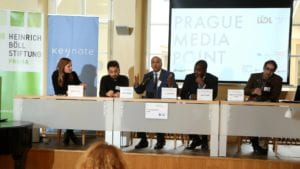 Journalists, scholars, activists, politicians, librarians, students all came together from November 2-4 to debate how to combat fake news at the conference Media in the Post-Truth World: The New Marketplace of (Dis)information.
Journalists, scholars, activists, politicians, librarians, students all came together from November 2-4 to debate how to combat fake news at the conference Media in the Post-Truth World: The New Marketplace of (Dis)information.
Speakers from sixteen countries – many from post-Communist countries seeing the rise of right-wing extremism in government– brought their different takes on how fake news is playing out in their countries. The conference was organized as part of the Prague Media Point, an annual event dedicated to discussing the changing media.
Discussion topics included the role of traditional media and the spread of fake news. On this subject, Ute Schaeffer from the Deutsche Welle Academy said: “As journalists we have to stop finding excuses why not to react in the face of fake news! We have to offer inspirational stories to the public.” Maranke Wieringa from Utrecht University added that it is often politicians themselves who spread false information to legitimize their policies: “The problem isn’t that politicians don’t read traditional news, but that they ignore it.”
Russia expert Mark Galeotti and leading sinologist Martin Hála discussed the spread of state propaganda. Martin Hála argued that while Russians may attempt to delegitimize the Western narrative, they lack a competitive strategy or ideology. Chinese propaganda, on the other hand, is both better-funded and more strategic, offering a well-thought-out Chinese alternative to the ‘decaying’ Western model.
What are some ways journalists can try to regain credibility in the current climate and untangle the web of misinformation? The conference focused on practical solutions, not only scholarly discussion, featuring presentations of successful projects that focus on enhancing media literacy and validating facts. IREX introduced a project that has sought to increase media literacy in Ukraine. “It does not matter what information we receive, but how we receive it,” said project director Mehri Karyadgyyeva. Matus Kostolny from Dennik N, a successful independent, readership-funded Slovak online newspaper,declared: “Should journalists become activists? Yes, if we are defending democracy!” “The conference took us out of our academic bubbles,” said NYU Prague Assistant Director for Academic Affairs Vanda Thorne.
Aurora Wallace, Director of Undergraduate Studies at NYU Steinhardt’s Department of Media, Culture, and Communication, spoke about fake news in a historical context, noting its origins with the HG Wells 1938 radio show War of the Worlds. Sarphan Uzunoglu from Kadir Has Universitesi in Istanbul noted that ‘Post-truth’ is nothing new, lying is a part of politics; in polarized communities it is a great industry.”
The masterminds of the conference are Jakub Klepal from Keynote and Jeremy Druker, NYU Prague faculty member and founder of Transitions, an NGO established to strengthen the news media in post-Communist countries. „We live in an era of relativizing the truth and informational chaos,” notes Klepal. “ Independent, quality and investigative journalism must survive because it is one of the pillars of liberal democracy. For our future, it is essential that we do not cease to seek the truth, even though we are often lost in misinformation and fake news; otherwise, we will end up in chaos and passivity.”
The conference was organized by Transitions and Keynote, with the support of NYU Prague, the Heinrich-Böll-Stiftung Prague, the Representation of the European Commission in the Czech Republic, Embassy of the Federal Republic of Germany in Prague, Open Society Fund Prague and the Institute of Communication Studies and Journalism at Charles University.